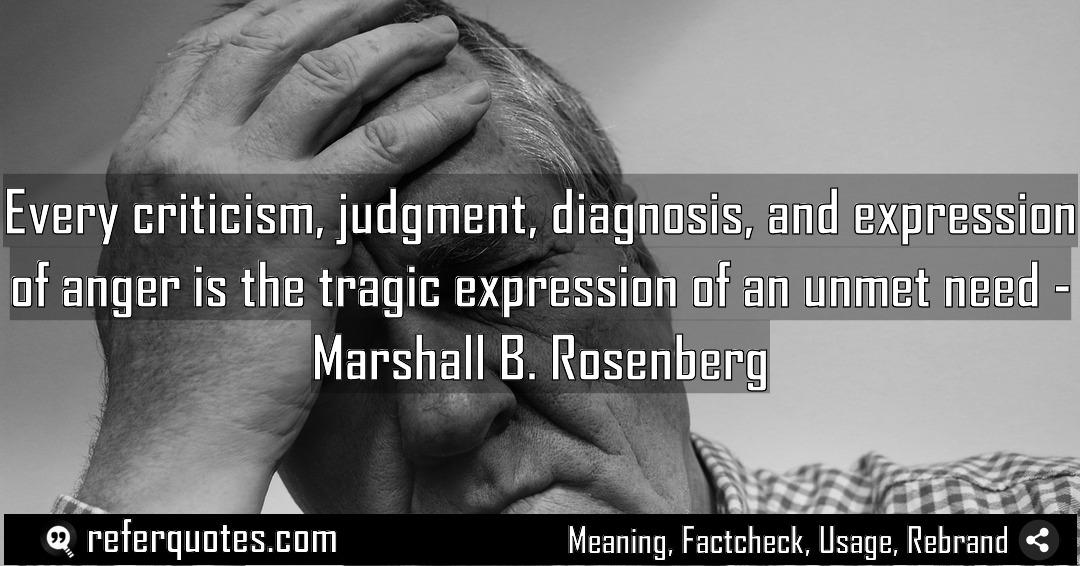
Every criticism, judgment, diagnosis is really just a tragic expression of an unmet need. It’s a game-changing way to reframe conflict and communication, shifting blame into understanding.
Share Image Quote:
Table of Contents
Meaning
At its heart, this quote tells us that all our negative communications are really just clumsy, often painful, cries for help. They’re signals pointing to something we deeply value that’s currently missing.
Explanation
Let me break this down for you. For years, I used to get so caught up in the “what” someone was saying—the anger, the blame. But Rosenberg’s framework flips the entire script. It’s not about the surface-level complaint. It’s about the deep, human need underneath it.
Think about the last time you snapped at someone. Maybe you said, “You’re so inconsiderate!” That’s the judgment, the criticism. But what’s the unmet need? Probably a need for consideration, for respect, for your time to be valued. The anger is just the tragic, inefficient vehicle for expressing that. It’s tragic because it usually pushes people away, making it harder to get your need met.
Once you start seeing conflict through this lens, it changes everything. You stop hearing attacks and start hearing pleas.
Quote Summary
Reading Level78
Aesthetic Score92
Origin & Factcheck
This is pure Marshall B. Rosenberg, coming straight from his 2005 booklet, Raising Children Compassionately. It’s a core tenet of his life’s work, Nonviolent Communication (NVC). You sometimes see similar sentiments floating around, but this phrasing and this profound insight is uniquely his.
Attribution Summary
Where is this quotation located?
| Quotation | Every criticism, judgment, diagnosis, and expression of anger is the tragic expression of an unmet need |
| Book Details | Publication Year/Date: 2004; ISBN/Unique Identifier: 9781892005140; Last edition: PuddleDancer Press, 1st Edition, 48 pages. |
| Where is it? | Chapter: Listening Beyond Anger, Approximate page from 2004 edition |
Context
He wrote this specifically in a parenting guide, which is so perfect. Where do we see more raw, unfiltered expressions of unmet needs than with kids? A toddler’s tantrum isn’t just “bad behavior”—it’s the tragic expression of a need for autonomy, or sleep, or a snack. Applying this to parenting transforms it from a power struggle into a detective game to uncover the real need.
Usage Examples
Here’s how you can actually use this, like, today.
- In a team meeting: When a colleague dismisses an idea as “naive,” instead of defending it, get curious. Ask yourself, “What’s their unmet need?” It’s likely a need for security, for a proven strategy, for reassurance. Address that, and the conflict dissolves.
- With your partner: The classic “You never listen to me!” isn’t an factual accusation. It’s a tragic expression of a need for connection, understanding, and to be heard. Respond to the need, not the “never.”
- For self-awareness: Catch yourself the next time you feel critical or judgmental. Pause and ask, “What am I needing right now that I’m not getting?” The answer is your roadmap out of the negativity.
This is for anyone who communicates—leaders, parents, partners, friends. It’s the ultimate decoder ring for human interaction.
To whom it appeals?
Share This Quote Image & Motivate
Motivation Score85
Popularity Score90
Shareability Score87
FAQ
Question: So, does this mean all anger is invalid and we should never express it?
Answer: Not at all. The key word is “tragic.” Anger is a valid, natural emotion that signals something important. The “tragic” part is when we express it as blame or judgment, which usually backfires. NVC teaches us to express the anger by connecting it to the unmet need, which is far more powerful and effective.
Question: What if the person is just being difficult or manipulative?
Answer: This is the biggest hurdle. The framework still applies, but the “need” might be for power or control. The practice is to hear the strategy (the manipulation) as a poor attempt to meet a universal need. It doesn’t mean you condone the behavior, but understanding the need allows you to address the root cause, not just the symptom.
Question: Is this about being passive and not standing up for yourself?
Answer: Quite the opposite. It’s about the most powerful way to stand up for yourself. Instead of saying “You’re a jerk,” which puts people on the defensive, you learn to say, “I feel angry when that happens because I have a deep need for respect.” That’s clear, honest, and almost impossible to argue with. It’s assertive, not aggressive.
Similar Quotes
Anger is not wrong; it’s a sign… that’s the game-changing insight from Marshall Rosenberg. It completely reframes anger not as a problem to be suppressed, but as a crucial signal…
Criticism is dangerous because it wounds… It’s a simple truth, but one that fundamentally reshapes how you lead and connect with people. Table of Contents Meaning Explanation Origin & Factcheck…
Behind every child’s anger is a need… it sounds simple, right? But this one idea completely reframes how we see tantrums and teenage slamming doors. It’s not about defiance; it’s…
You know, that idea that ‘Every message, no matter how harsh…’ is really about listening for the need behind the anger. It’s a game-changer for communication, shifting your focus from…
You can measure a person’s greatness by what it takes… it’s one of those quotes that sounds simple but hits you harder the more you think about it. It’s really…
